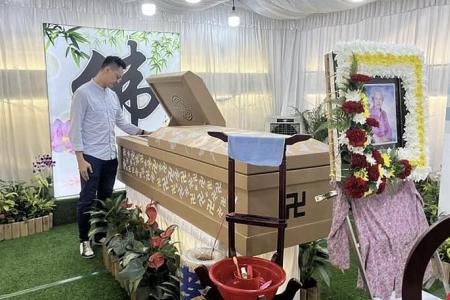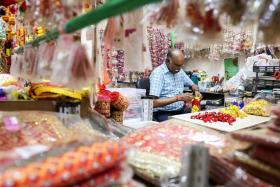Cardboard coffins gaining ground among the eco-conscious
Mourners who paid their last respects to the late Ms Wang Jin Lian in March were greeted by an unusual sight – a cardboard coffin.
The body of the 93-year-old grandmother lay not in the typical wooden casket, but in biodegradable paper, patterned with Buddhist swastikas and a print of 38 lotus flowers.
The final well-wishes of her great-grandchildren were scribbled directly onto its surface, ahead of cremation.
Such paper coffins are a sustainable alternative to wooden coffins, and though they are popular mostly within minority green circles, major funeral parlours here are beginning to pick up on demand.
In January 2024, Unity Casket became the first major player to launch a cardboard product. Orders doubled in just four short months. The firm used to average one to two orders a week, now it moves three to five, said funeral director William Tan.
The appeal of a cardboard coffin lies in its “simplicity, affordability and environmental sustainability”, he added.
Wooden coffins can range anywhere between $300 and $6,000, while cardboard ones start at $300 but are capped at $2,000 for only the most elaborate customisation, said Mr Tan.
More to the point, “many of our clients are drawn to the idea of expressing their values even in their final arrangements”, said Mr Tan.
The fast-burning material saves up to 30 minutes in cremation time, reducing air pollution.
Unlike traditional wood coffins, cardboard coffins are not varnished with lacquer and do not emit as much damaging gases when incinerated.
All cardboard coffins must be approved by the National Environment Agency (NEA) before they can be sold.
Inventor and patent-holder of Singapore’s first approved cardboard coffin design Ng Khee Yang said his “eco-ffin” can catch fire in less than three minutes.
He designed Singapore’s first cardboard coffin about 14 years ago when NEA put out a call for new methods to hasten the cremation process, as facilities at the now defunct Mount Vernon crematorium could not keep up with demand, he said.
But by the time he finished his blueprint, Mandai crematorium had been built.
Mr Ng, 60, has been casually peddling his eco-ffin since then, supplying any orders he receives – “about one to two a year,” he said.
Demand has stayed constant over the years, never spiking or dipping, said the ex-polytechnic lecturer.
Now a church volunteer, he puts the slim interest in his eco-ffin down to a lack of marketing, as well as Chinese funerary tradition, which has resisted the exponential growth of the green movement.
“There’s the notion of filial piety among the Chinese when it comes to coffins. The more expensive and the thicker the wood, the better,” he said.
But the tide shows signs of turning.
Mr Jasper Chan, 40, the grandson-in-law of the late Ms Wang, said the family went for Unity Casket’s cardboard offering knowing she was a “very open-minded person” and would have approved.
“She enjoyed nature and would take walks in parks,” he said. The family was also keen on personalising the design of the box, drawing flowers, mahjong tiles and the lucky “ban luck” hand – the winning ace and picture card pair in Chinese Blackjack – on its shell.
“It was very, very memorable,” he said.
Get The New Paper on your phone with the free TNP app. Download from the Apple App Store or Google Play Store now


